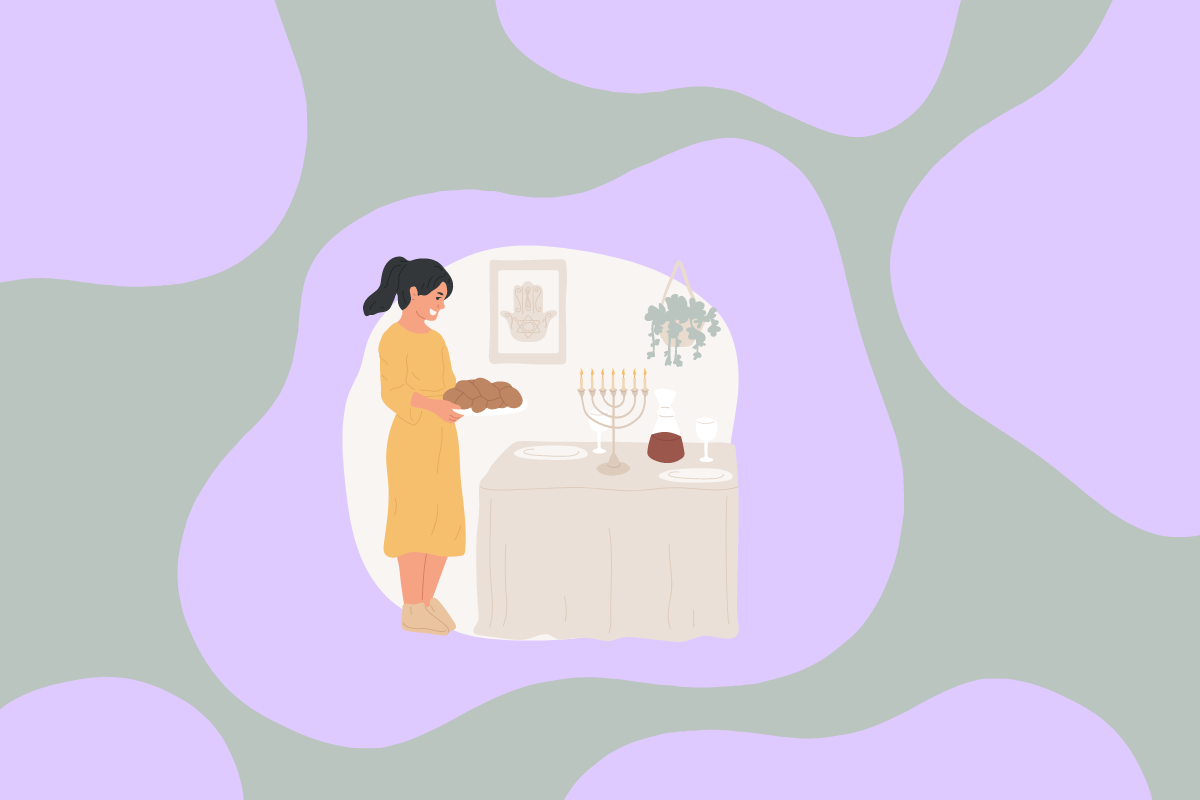“I want to start lighting candles on Shabbat,” I told my husband Aaron. “I think it’d be a nice way to end the week and special for Ori to know we’re done working and it’s going to be family time.”
“Let’s do it,” he agreed. “We’ll need supplies.”
So we set out to get the requisite supplies, or at least those we could scrounge up. My mother-in-law lent us her bat mitzvah candle holder, but couldn’t find Aaron’s Kiddush cup. Aaron found an old box of candles in our apartment, which once belonged to his bubbe. I made a challah for the first time.
Get Kveller's beautiful, step-by-step guide to experiencing Shabbat on your own terms. Order The Kveller Shabbat Guide here.
And then, it was here: the night of our first Shabbat. Well, my first Shabbat, and our 1.5-year-old son’s first Shabbat. (Our newborn baby’s too, though I’m not sure how much she paid attention.)
It was a peak summer evening and the sun was still shining outside. We started early because I wanted to share the experience as a family and, sorry God, in this house we don’t push back bedtime.
I’d heard all about Shabbat, of course, and learned about it in the course of my conversion studies. But once it had actually arrived, I was struck with a barrage of internal questions on the ritual’s minutiae: What’s the right order for everything again? How long do I cover my eyes after swishing? Is this an awkwardly long time or awkwardly short?
The dinner itself was decidedly not kosher, but there we were, trying to observe in some way.
Ori was in his highchair, getting ornery for food.
“It’s Shabbat tonight! We’re going to light candles!” I told him, setting up the candleholders on the table.
What he heard was: You have to wait longer to eat.
“MORE BREAD!” Ori screamed, increasingly agitated that this was taking so long. I decided we’d have to switch up the order and sate the toddler.
“Why don’t you say the motzi?” Aaron asked me. “You made the bread.”
I think I remember the words but now I’m not sure. Is it said? Chanted? Sung?
“You can say it…” I replied.
“Baruch atah, Adonai Eloheinu melech haolam, hamotzi lechem min haaretz!” he proclaimed, tearing into the loaf.
We lit the candles and sang the blessing. Ori was confused and started to whine. He was not into it.
I had to pause and remind myself of a parenting truism that still catches me off guard: Oftentimes, the things you think your child will be excited about are met with indifference and things you never imagined will elicit pure joy. It was a reminder to be present, to remember that he didn’t have the context for what we were doing or why yet. It was his first Shabbat. Mine too. We were learning together.
Then I remembered we have a children’s book about Shabbat that Ori had been liking, so I brought it to the table.
“Shabbat is coming,” I read, pointing to the picture and text in the book. “Shabbat is here!” I said, pointing to the setup at our table.
“Look, they’re eating challah and we’re eating challah. They lit candles and we lit candles.”
He was interested. Suddenly, it clicked. This is something people do. This is something we do. He studied the pages intently, then looked up to study our table.
“Read it again?” he asked.
So we did read it, again and again. It was a beautiful moment, watching his desire to learn, watching him make connections, watching him start to absorb these rituals.
As I watched the beginnings of a new family tradition unfold in real time, I was momentarily taken aback by the power of that: to shape tradition, tradition that will become a foundation in his life.
So maybe our first Shabbat wasn’t the strongest by-the-book foundation. The sun was still bright outside and while they are labors of love, there is work in caregiving, especially for young children, that doesn’t pause.
The important thing is we laid the foundation. We can strengthen it with time. We can build on it.
One day we’ll find the Kiddush cup. Another day we’ll find more ways to truly rest.
But that night, we gathered as a family, basking in the glow of candlelight, reading a book, eating fresh bread, and feeling grateful for the promise of uninterrupted time together.
It was the start of something. It was a continuation of something.
“Read it again?” Ori asked for the tenth time.
Flipping the book back over, I turned to the first page, and the story continued.








